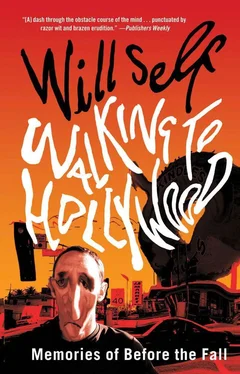Will Self - Walking to Hollywood
Здесь есть возможность читать онлайн «Will Self - Walking to Hollywood» весь текст электронной книги совершенно бесплатно (целиком полную версию без сокращений). В некоторых случаях можно слушать аудио, скачать через торрент в формате fb2 и присутствует краткое содержание. Год выпуска: 2011, Издательство: Grove/Atlantic, Inc., Жанр: Современная проза, на английском языке. Описание произведения, (предисловие) а так же отзывы посетителей доступны на портале библиотеки ЛибКат.
- Название:Walking to Hollywood
- Автор:
- Издательство:Grove/Atlantic, Inc.
- Жанр:
- Год:2011
- ISBN:нет данных
- Рейтинг книги:4 / 5. Голосов: 1
-
Избранное:Добавить в избранное
- Отзывы:
-
Ваша оценка:
- 80
- 1
- 2
- 3
- 4
- 5
Walking to Hollywood: краткое содержание, описание и аннотация
Предлагаем к чтению аннотацию, описание, краткое содержание или предисловие (зависит от того, что написал сам автор книги «Walking to Hollywood»). Если вы не нашли необходимую информацию о книге — напишите в комментариях, мы постараемся отыскать её.
Walking to Hollywood — читать онлайн бесплатно полную книгу (весь текст) целиком
Ниже представлен текст книги, разбитый по страницам. Система сохранения места последней прочитанной страницы, позволяет с удобством читать онлайн бесплатно книгу «Walking to Hollywood», без необходимости каждый раз заново искать на чём Вы остановились. Поставьте закладку, и сможете в любой момент перейти на страницу, на которой закончили чтение.
Интервал:
Закладка:
The alcohol certainly helped, but, with hindsight and the benefit of career résumés — gobbets of gossip sucked up gummily in dentists’ waiting rooms — I can only conclude that Tertia was practising on me. Of course, unlike her many subsequent conquests, I had no reputation to sully, family to alienate or assets to strip. Nor could she have wanted to humiliate me sexually — after all, she was only fifteen. Still, humiliated I was: it was all over in hundredths of a second, with four layers of clothing for prophylaxis.
I say I had no assets — but there was one: Sherman. I understood enough of the family dynamic to realize that he, by reason of his charm quite as much as his disability, was doted on by both his parents. He was also their only son, and moreover, although we may balk at such dispositional crudity, their daughters were already outsoaring them, while Sherman would always remain their little boychick.
My rapidly cooling semen pooling in my underpants, I recoiled from Tertia, who gave a precociously vicious laugh. There she sprawled, the diamonds of evening sunshine scattered across her bare belly, her father’s obsessively aligned pen stand, his Dictaphone, and paperclip holder, etc. Is it only a currently felt scar, rather than the memory, that makes it seem now as if there was more pathos and eroticism on that desktop than I would ever fully grasp — let alone experience?
Then there was Sherman. So much was unsaid between us — could not even be framed, still. I knew these teen soirées were a nightmare for him; that as our hormones spurred us on, he felt he lagged further and further behind. Earlier that day, on the phone, he had said heavily: ‘Stick by me this evening, will you?’ Now I’d not only abandoned him but been seduced by his little sister.
I yanked my way out of the study, madly scanned the kids in the kitchen, the living room, pelted to the top of the house and checked there, then tumbled down a storey to Sherman’s bedroom, where the sensitively truncated furniture and juvenile decoration belied the.22 air pistol and cubic inch of Pakki Black I knew he had hidden under the floorboards. He was nowhere to be seen — but had he seen us?
I eventually located him in the most sunken part of the garden, standing by the perfectly round pond fringed with marigolds and primulas. He had his back to the house, and before I heard the words of his bitter rant, I saw all the tension in his blocky shoulders; crammed into them were all conceivable miseries — for now, forever. Over and over he incanted, ‘Fucking cunts, fucking cunts, fucking fucking fucking cunts…’ — a bizarre accompaniment to Bryan Ferry’s complacent yelp of ‘What’s her name, Virginia Plain’, which was belting from the open french windows.
Worse was to emerge: first Sherman’s handsome face uglified by tears, then Sherman’s square fist raised like a pestle before being ground down hard into the mortar of his palm, again and again — ‘Fucking cunts, fucking cunts, fucking fucking fucking cunts…’ — while in that hand, already mashed, glistened the innards, the greyish braided and bloodied fur, of Max Headroom, Tertia’s beloved mouse.
I let him wind himself down. I let him punch me in the stomach with his gory knuckles. I took the mouse’s corpse and lost it in the compost heap. I took Sherman in through the side door and washed his Othello hands in the little sink in the little bathroom beside the great big kitchen. Then I got the hash. We sat back down by the pond and I stuck three Rizla papers together, split a Benson & Hedges and built a joint. We passed it between us, sucking up the smoke, acrid as Accra. Then Sherman said a lot of the unsayable things — about how it was for him, and how he feared it would be.
Inevitably, after that night we didn’t so much drift as scamper apart. I never grew any more, only became annealed by a life that seemed at the time to have had plenty of significant events — addictions, affairs, marriages, children, the micro-mosaics of literary composition — yet which, when I came to in the dusty stalls of middle age, I realized had been altogether lacking in high drama: no blitz or pogrom had been visited on me; the angel of death awaited me in Edgware or Bushey, at a care home, in a cardigan.
Of Sherman I had picked up bits and pieces over the years — he had done a foundation art course somewhere in the north, then dropped out. Next I heard it said he was in Berlin, squatting in the Kreuzberg — and incidentally driving his parents to despair. Then he was back in England and at Goldsmiths completing his studies. All this seemed apt: he was merely another contemporary I had lost touch with, his life to be expressed through the bare bones of his curriculum vitae, rather than felt for, or loved.
Then, in the late 1980s, there began the inexorable rise of Sherman Oaks, the artist.

From the very beginning the Oaks phenomenon caught the public’s imagination. His contemporaries may have been flashier and more pretentious — but, while they were conceptualists, at a remove from the fabrication of their works, he was an unashamedly personal actualizer, a macher , who hewed stone and wood; shaped, pummelled and spun clay; smelted and cast iron, bronze and steel. He created enduring facts on the ground — not airy abstractions of blood, meat and crumpled paper that had life only in temperature-controlled galleries. That he, a middle-class Jewish boy, should be working on such pieces alongside tough Northumbrian welders and phlegmatic West Country stonemasons made the enterprise seem that much more authentic. That Sherman was also a person of restricted height lent a greater poignancy to his monumental works, which, twice and three times life size from the outset, grew still larger as soon as he got the funding. And of course, every single piece derived from his own body.
For the masses, with their fractals of I-know-what-I-like ceaselessly yet variably replicated throughout the nineties then the noughties, this was narrative enough — but Sherman evinced a modesty that, if not exactly false, certainly didn’t ring true to me. Not for him the dialectical twaddle of theorizers, or the de haut en bas of the new Kulturkampf . Instead, when interviewed he’d cackle disarmingly, ‘I’m a very small man making very big things.’ Then, if pressed, he’d add, ‘Believe me, mine is an utterly content-free art: what you see is what you get.’
I tracked his progress, first through newspaper and magazine items, then larger features, then radio and television segments. Invitations to private views arrived concurrently — at first to group exhibitions, then solo ones and eventually retrospectives. The evolution of his ‘content-free art’ had almost amused me. More remarkable was his ability, unerringly, to produce a likeness of himself — even when it was a 64-foot-high basketry woven from steel struts. Nevertheless, I would scrutinize the pasteboards for a while, tracing the fine lettering with my own gross digit, then whirl the duff Frisbee away into the pile of waste paper in the corner of my writing room; a pile that I bagged up weekly, then deposited outside the house, so it could be carted away, pulped and turned into more invitations to private views.
I supposed we must meet again eventually — we revolved in interlinked circles of the social Olympiad — but I was in no hurry. I suspected that after the enormous success of Sherman’s Behemoth , a 128-foot-high body form set astride the Manchester Ship Canal near Runcorn, he would — no matter how small — have become too big for his boots. ‘Behold,’ read the inscription on the plinth, ‘he plunders the river and does not harden.’ The sculpture had at first been the occasion for local scorn, then regional and eventually metropolitan. But inevitably, when it became internationally regarded as an icon of the new and prosperous Britannia, it was appropriated as a symbol of national pride. Sherman had accepted a gong from the government.
Читать дальшеИнтервал:
Закладка:
Похожие книги на «Walking to Hollywood»
Представляем Вашему вниманию похожие книги на «Walking to Hollywood» списком для выбора. Мы отобрали схожую по названию и смыслу литературу в надежде предоставить читателям больше вариантов отыскать новые, интересные, ещё непрочитанные произведения.
Обсуждение, отзывы о книге «Walking to Hollywood» и просто собственные мнения читателей. Оставьте ваши комментарии, напишите, что Вы думаете о произведении, его смысле или главных героях. Укажите что конкретно понравилось, а что нет, и почему Вы так считаете.












